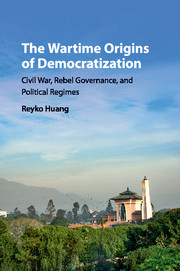Book contents
- Frontmatter
- Contents
- List of Figures
- List of Tables
- List of Acronyms
- Acknowledgments
- 1 Introduction
- 2 War-Making, Mobilization, and Democratization
- 3 Rebel Governance: How Rebels Interact with Ordinary People During Conflict
- 4 Testing the Effects of Rebel Governance on Postwar Democratization
- 5 Tracing the Steps from War Time to Peace Time: Case Studies Overview
- 6 War and Change in Nepal
- 7 War and Postwar Regime Formation in Uganda, Tajikistan, and Mozambique
- 8 Conclusion
- Appendix Rebel Governance Dataset: Notes, List of Cases, and Summary Statistics
- Bibliography
- Index
7 - War and Postwar Regime Formation in Uganda, Tajikistan, and Mozambique
Published online by Cambridge University Press: 05 September 2016
- Frontmatter
- Contents
- List of Figures
- List of Tables
- List of Acronyms
- Acknowledgments
- 1 Introduction
- 2 War-Making, Mobilization, and Democratization
- 3 Rebel Governance: How Rebels Interact with Ordinary People During Conflict
- 4 Testing the Effects of Rebel Governance on Postwar Democratization
- 5 Tracing the Steps from War Time to Peace Time: Case Studies Overview
- 6 War and Change in Nepal
- 7 War and Postwar Regime Formation in Uganda, Tajikistan, and Mozambique
- 8 Conclusion
- Appendix Rebel Governance Dataset: Notes, List of Cases, and Summary Statistics
- Bibliography
- Index
Summary
In Uganda, Tajikistan, and Mozambique, the achievement of independent statehood opened up new chapters of instability: in each case, a newly sovereign government found itself fighting against formidable opposition groups using violence in attempts to seize state control. The outcomes of these armed contests were highly divergent. In Uganda, a victorious rebel leader became president and combined a tightly controlled autocratic national government with village-level democracy. In Tajikistan, a civil war that began with proreform movements ultimately did little to move the new state out of the shadow of Soviet-era governance, and in fact did much to entrench a strong autocratic regime. In Mozambique, international donors working to install democracy in postconflict states in the euphoria of the immediate post–Cold War years saw to it that the state was promptly put on a course of foreign-guided (and funded) democratization.
What explains the divergent regime outcomes across these cases? As described in Chapter 5, I glean the secondary literature to conduct process-tracing within each case as well as structured comparisons across the cases with a view to testing the utility of the civilian mobilization theory and alternative arguments. The evidence shows consistent, and at times even surprising, support for the theory's causal link between forms of rebel war-making, social mobilization, and regime continuity or regime change. In contrast, the rebel statebuilding theory, to the extent that I am able to test it in this chapter (in the case of Uganda), finds little empirical support.
Uganda
Scholars of civil wars, insurgencies, and post–civil war political regimes have often turned to the case of Uganda with some fascination, and for good reasons. The National Resistance Army (NRA), led by Yoweri Museveni, was arguably as disciplined as contemporary rebel armies go, and even as it fought, the group attracted civilian support by engaging in a unique and effective grassroots democratization project in the territories it controlled. After defeating the regime of Tito Okello in 1986 and storming into Kampala, Museveni led the country on an unprecedented course of political and economic development, the strategy of which combined further democratization at the village level with an unwavering defense of one-party rule at the center.
- Type
- Chapter
- Information
- The Wartime Origins of DemocratizationCivil War, Rebel Governance, and Political Regimes, pp. 140 - 174Publisher: Cambridge University PressPrint publication year: 2016
- 1
- Cited by



